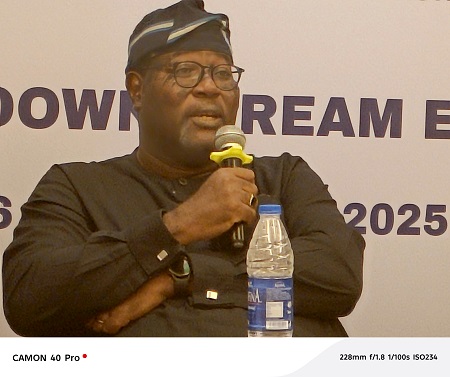Otunba Adetunji Oyebanji, Chairman of OTL
-Felix Douglas
Speaking at the opening ceremony of the OTL Africa Downstream Energy Week, the Chairman, Otunba Adetunji Oyebanji stated that each year, the gathering serves as a bridge between policy and practice, a meeting point for thought leaders, regulators, operators, investors, and innovators committed to building a strong and sustainable future for Africa’s downstream energy sector.
The OTL Chairman said the theme for this year, “Energy Sustainability: Growth Beyond Boundaries & Competition,” is both timely and visionary. It reflects the realities of today’s energy landscape, one defined by volatility, innovation, and transformation, and challenges us to seek growth that is sustainable, inclusive, and without limits.
According to Oyebanji, the global energy industry is at an inflection point. Across continents, shifting geopolitical tensions continue to influence production, pricing, and supply chains. The ongoing conflicts in Eastern Europe and parts of the Middle East have kept global oil markets tight, creating uncertainty in both demand and distribution. Meanwhile, the steady march toward energy transition is reshaping investment priorities, with cleaner fuels, carbon capture, and renewable integration increasingly taking centre stage.
“For Africa, and indeed for Nigeria, these changes present both challenges and opportunities. As the world redefines its energy future, our continent, richly endowed with resources and youthful human capital, must position itself not just as a supplier of raw hydrocarbons, but as a hub for innovation, efficiency, and value addition.”
Energy sustainability is not merely about preserving resources; it is about ensuring that our growth today does not compromise the prosperity of tomorrow. It is about building an industry that is competitive, responsible, and adaptable to a rapidly changing global environment.
Oyebanji made it known that Africa stands at a defining moment in its energy evolution. Across the continent, rising populations, industrialization, and urban expansion are driving energy demand at unprecedented rates. At the same time, investments in refining, gas infrastructure, and cross-border energy trade are reshaping the continent’s energy map.
Nigeria, as Africa’s largest energy producer and consumer, occupies a central position in this transformation. The deregulation of the downstream petroleum sector, the renewed commitment to gas commercialization, and the focus on infrastructure development have laid a foundation for long-term growth.
“To truly achieve growth beyond boundaries, we must broaden our scope, integrating renewables, strengthening regional cooperation, and leveraging technology to enhance operational efficiency. We must also continue to nurture human capacity, ensuring that the next generation of professionals is equipped to sustain and expand the gains we have made.”
The OTL Chairman said downstream market continues to evolve amid both turbulence and renewal. The removal of fuel subsidies and the liberalization of the market have brought new realities, tough, but necessary steps toward a more competitive and efficient sector.
Operators are facing increased costs, supply chain disruptions, and regulatory complexity. Yet, we are also seeing unprecedented innovation, in logistics optimization, storage efficiency, digital trading platforms, and cleaner fuel distribution models. These developments are redefining competitiveness and signaling the emergence of a more resilient, forward-looking market.
The future of energy must be one that transcends boundaries, geographical, technological, and conceptual. As the lines blur between traditional hydrocarbons, renewables, and alternative energy sources, it becomes clear that the path to sustainability lies in integration rather than isolation.
“We must build systems that encourage innovation while safeguarding the environment. We must promote efficiency not just as an operational metric, but as a core philosophy. And we must ensure that growth extends beyond corporations and markets to touch lives, providing access.”
He pointed out that over the past nineteen years, OTL Africa Downstream Energy Week has established itself as the continent’s most influential platform for policy dialogue, business networking, and industry development in the downstream energy value chain.
Through the years, OTL has provided a consistent platform for engagement between government and private sector, fostering ideas that have shaped national and regional policies. It has created a space where regulators listen to industry, and industry, in turn, aligns with policy direction.
“As we look to the future, the imperative is clear: Africa must define its own path to energy sustainability. The opportunities before us are immense, but they require courage, clarity, and cooperation.”
Oyebanji urged stakeholders to invest in infrastructure, pipelines, depots, data systems, and digital tools. We must build capacity through research, training, and innovation. And we must hold ourselves accountable to the highest standards of transparency and environmental responsibility.
“The downstream sector remains at the heart of Africa’s energy value chain. Its growth and transformation will determine how successfully we navigate this new era of sustainability and competition. Let us therefore seize this moment with purpose and foresight, working together to ensure that our industry not only survives change, but leads it.”


Comment here